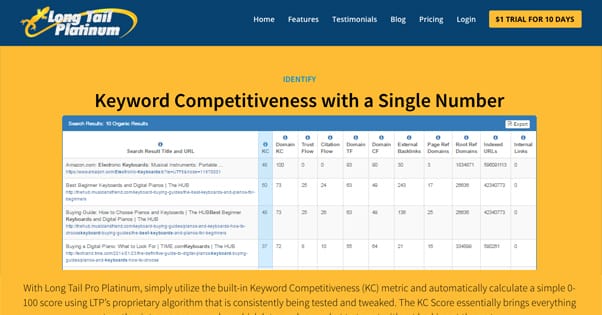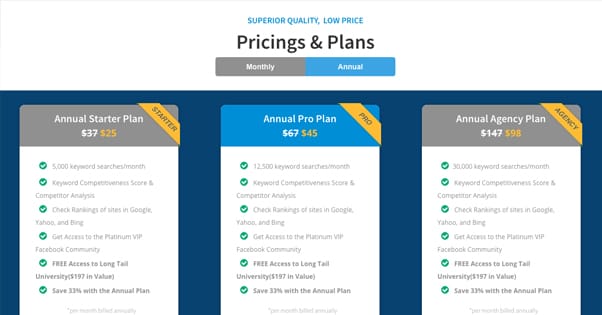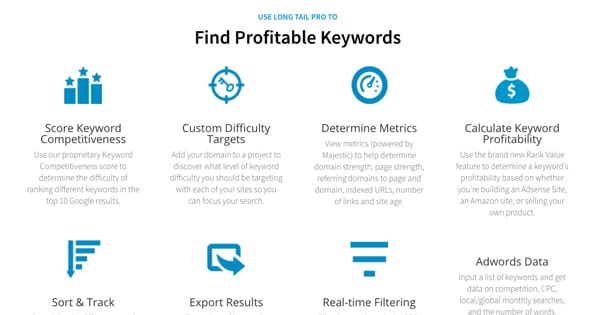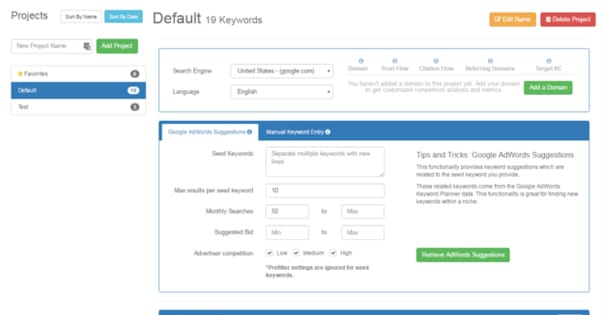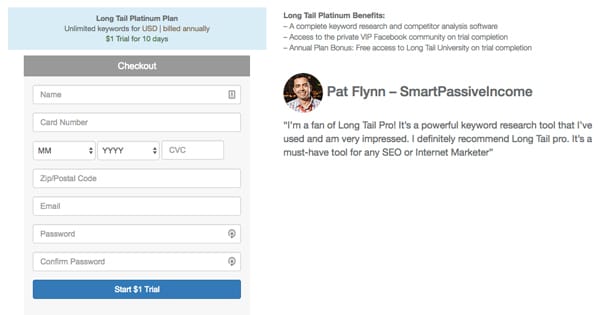A Comprehensive Review of Long Tail Pro Software
Published by James Parsons • Resources • Posted September 12, 2016 ContentPowered.com
ContentPowered.com
If you’re running a site, you’re going to encounter the phrase “keyword research” all over the place. While I’m not a fan of keyword density and specific keyword utilization strategies, even I can’t deny the need for keyword research on a blog. It’s what guides your choice of topics, it’s what helps you find lower competition niches, and it’s how you can scrape and claw out incremental advantages over your competitors.
Drilling down a level, any time you’re researching tools to help you with keyword research, one name you’re going to encounter over and over is Long Tail Pro. LTP is a desktop application released in 2011, made for assisting you with keyword research. However, like many marketing tools, one should be skeptical. Does this one actually save you time and money? Or is it just a scam, designed to make you think you’re getting value when you’re just wasting time?
Where to Find Long Tail Pro or Platinum
The program Long Tail Pro can be found at their website. As you might expect, most of the links you’ll find online are affiliate links from marketers looking to make a quick buck from other marketers.
LTP has two different plans you can purchase when buying the app. These are the Platinum Monthly and the Platinum Annual. As the names imply, the primary difference between them is when you pay. Monthly is monthly payments of $37, for a total of $444 per year. The Annual plan is only $25 per month, working out to be $300 per year. All in all, not too bad for a piece of marketing software, some of which can cost $300 per month. Note that these fees are accurate as of September 1, 2016. It’s entirely possible that they have changed since the writing of this post; I’ve seen other numbers cited in other reviews as well.
Additionally, the Annual plan comes with access to their self-branded Long Tail University, which is a course of lessons starting with the basics of different kinds of keywords, and moving on to topics like picking seed keywords, analyzing competition, and other such marketing details.
An honest aside here; their YouTube video preview of Long Tail University is kind of lacking in audio balance. I haven’t gone into their lessons to see if other videos have the same telltale signs of low production value, but at least they’re better than many of the low quality alternatives available for free.
As a final note, both the Monthly and Annual plan start with 10 days for $1 as a “risk free trial.” It’s not free, as it costs that single dollar, but it does allow you to test out the app for what might as well be free. There’s no lock in contract for the trial, so you can cancel if you don’t like it or if your current process works better.
The Features of Long Tail Pro
Looking again at the Long Tail Pro website, we can see the features they advertise. At the top, obviously enough, is keyword research. The application essentially uses automation and the Google Keyword Planner tool to take a seed keyword of your own and expand it into as many as 800 keyword variations. Now, not all of those variations are guaranteed to be worthwhile, valuable, or even meaningful, but the volume is the important part. The second step of keyword research is to narrow down your list, so if you ever find yourself with too few keywords, your list wasn’t big enough.
The second feature is competitive analysis. When you plug in a seed keyword, Long Tail Pro will scrape the top ten Google search results for that keyword and will analyze them. They will give you, in a nice table format:
- The page meta information, including the URL, the title, the meta description, and any meta keyword tags they have implemented.
- The page authority metrics, including Moz’s Page Authority, Domain Authority, and MozRank, as well as PageRank from Google if it’s available.
- Assorted other page metrics, including the number of backlinks, the age of the domain, and the calculated “competition metric.”
The Long Tail Pro competition metric is interesting, because it takes a number of different metrics, mostly those listed above and a couple of others, and figures out an average competition score for the site. A site like Google, or Nike, or Oreo, or Amazon, is going to have a competition score in the upper 90s or 100 range. Sites that are basically spam or are 404ed will have a low, sub-10 competition score. Most sites in general will have a competition score ranging from around 10 to around 60.
Competition score is a per-keyword metric. What this means is that one site might have a firm hold on one keyword but another, related keyword has a much lower score. This is an opportunity for you to get your foot in the door with the lower competition keyword, and work up through higher competition keywords as your site grows in ranking and power.
Next, they talk about their real time filtering features, which allow you to sort through the keyword list it generates quickly and easily. You can filter by keyword, CPC suggestion, locality, search numbers, competition, and specific competition among advertisers.
Helpfully, they allow you to add notes to keywords directly in their interface. If you come across a good keyword in your filters and sorts, you can flag it with a note, and later on you can display just the keywords you’ve added notes to. This can also be useful for noting when you’ve used a keyword and when you haven’t, since keyword plans often end up using hundreds of different keywords per year.
Obviously, you also have the ability to export the data you have created in Long Tail Pro. The spreadsheets it creates are easy to work with, and you can add whatever custom macros you like in the spreadsheet program of your choice.
Keyword Research with Long Tail Pro
In order to generate keywords from Long Tail Pro, you need to start with some. You can’t simply point it at your website and let it go. You need to input what is known as a seed keyword.
Seed keywords are core keywords that apply to your site and your industry. For example, if you were in the pet industry, you might want to target puppies. A seed keyword might be “puppy,” simply enough. You’ll put that in and get a few hundred searches, all long-tail keywords, like “how to train a puppy” and “puppy obedience training.” As mentioned before, all of these keywords come with a whole host of information, displayed in columns next to the keyword phrases themselves.
It’s a very quick process to generate these keyword ideas. In most cases, it will only take a minute or two per seed keyword. The more seeds you have, the longer it will take, since it has to run all of its searches and harvest all of its data for each keyword.
While LTP is a very powerful suggestion engine, taking data from the Google keyword planner tool means it’s not necessarily unique. You can always simply use the keyword planner tool directly. You also need to have some seed keywords in mind, which means you need to have done some basic keyword research before you can use LTP to full advantage.
What it comes down to is that Long Tail Pro will save you time in generating massive keyword lists, but it’s far from the only way. What this means is that you’re spending money on a monthly basis in order to save time with doing a lot of keyword research manually. If that’s what you want, that’s fine; it’s a perfectly valid way to streamline your marketing process. If you were hoping for something that would be somewhat more automatic, perhaps something that would automatically filter out the best ideas for you, you’ll want to look elsewhere.
Competition Metrics
Now, Long Tail Pro has competitive research data in it as well. As I mentioned, they take the top ten results for a given keyword and show you the strength of the pages ranked already, as well as a derived metric they created to indicate numerically how challenging it will be to rank or beat the competition ranking for that keyword.
Moz has a similar metric, called Keyword Difficulty. It is part of their keyword explorer tool, which is part of a broader SEO toolset, which can be accessed with a 30-day free trial, after which it costs about $100 per month. However, you get a heck of a lot more than just a keyword planner tool for that cost, so it’s a wash in terms of value for your dollar.
I mention this so you don’t get too in deep thinking that the competitive strength ranking as produced by Long Tail Pro is in any way truly unique. Whether or not it’s accurate compared to other metrics depends a lot on the competition for the keyword, as well. Sites with relatively little data can fluctuate wildly based on a few small factors, whereas large sites will have more accurate readings, albeit higher because they will be harder to dethrone.
As a whole, it’s a useful feature, but it’s limited in that it only pulls from certain public data points. PageRank, for example, is more or less dead, and if LTP factors in the 0 PageRank to drag down a site’s competition, it’s going to have a lower ranking than it probably should. You’ll want to over-estimate the challenge of out-ranking a site with a 0 PR but higher Domain Authority, Page Authority, MozRank, and so forth.
One other thing to note is that in order for it to pull accurate Moz data, it generally needs access to a Moz account, which means you probably have to have one of those.
A Verdict
There’s a lot to like about Long Tail Pro, primarily in the fact that it does what would take you two or three different tools to do manually, at best. You could end up with five or six tools to harvest all of the data, plus having to put it all into a spreadsheet manually. It’s a lot of work!
It’s also SEO-safe, as far as these things goes. You’re not going to put your Google account at risk, you’re not going to get your site harmed in some way, etc. The only possible way to hurt your site would be to misuse keywords in the content you write.
On the other hand, there are a few drawbacks with LTP. For instance, it’s not free. It draws data from free tools, but it’s not free itself, so you may end up spending quite a bit of money for something you’re only really going to use once.
That said, they have that $1 free trial. If you’re on the ball, you can sign up for the trial and spend a week doing a lot of very dedicated research, generating as many different lists as you possibly can.
Don’t worry about filtering and noting them, just generate them. Then export all of the data and save it in a format you can use outside of LTP. Then you can cancel the trial, without having to pay the monthly fee, and you’re good to go.
This is more possible than ever, since Long Tail Pro used to have a $97 one-time fee to set up and use their software. This no longer applies.
All in all, Long Tail Pro is well worth using if you need to do a lot of keyword research all at once. If you’re the type of person to do a couple of searches each week or month, you’re looking at a piece of software that is very firmly in “overkill” territory. When you’re generating a handful of keywords, getting a list of thousands is a lot to handle. If you can take advantage of it, you’re good; if not, it’s not worth the expense.
